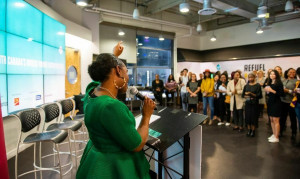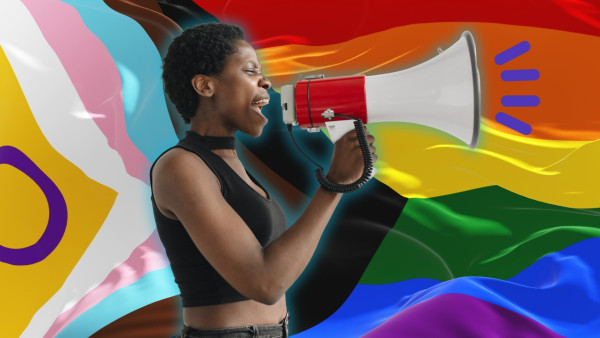But Oluwole was determined not to go down without a fight, and it was this determination that landed him the breakthrough he had been looking for, moving him from employee to CEO of his own company based in Ottawa. It’s called The3skills, a consulting agency specializing in helping international students acquire the non-academic skills that are so desperately needed to make it in the Canadian job market.
You left Nigeria at the age of 15, what was that like for you?
Tobi: It was pretty daunting. I'd always lived with my parents. It made me grow up and learn things I probably would have been shielded from till I was 18 or 19. It made me realize how important relationships were. I wasn't with my family, so my friends became my family.
Could you explain some of the difficulties you had when you came to Canada?
Tobi: I missed my parents all the time. It was hard to not see them for a year at a time, and sometimes two years at a time. I didn't have the support system I had the first 15 years. I couldn't go home to mom when something was wrong. I couldn't call dad to come and bail me out of a situation at school or wherever. The most difficult part was not having the support system I had back home. The other part was, not only did I not have my parents, I didn't have my uncles, my aunties, my cousins, and my friends. I went to a boarding school in Hamilton. The teachers and people who worked for the school were the ones taking care of me, and they made sure I was fed and stuff. It was a brand new place, and I had not grown up with anybody here. They were all strangers that eventually became friends. Lacking the support system and the network, was definitely the hardest part.
How hard is it for international students?
Tobi: It's extremely hard. There was a study from Stats Canada that said only about four percent of international students were able to go from work permit to permanent residency, as well as earn the same amount of money that Canadian students were making. Four percent is like a terrible number considering the fact that there are 580, 000 of them. Why is it so difficult? It is because when they come here, they focus just on their academics. Everyone (their parents, the school, everybody) tells them to focus on their academics because they are paying five to seven times more than the domestic students. The stakes are higher. Parents from back home are literally spending their whole retirement to give their kids a chance here. If you go into the numbers, you'll see that International students probably have really good grades; but, they don't learn anything else. They don't learn how to network. They don't learn how to build basic resumes. They don't learn how to be creative and stand out in the workplace. They don't learn any of the real-life skills, and this is where it hurts them. By the time they finish, they have nothing. They have a degree but they have no network. All their friends are International students, and nobody is working anywhere. It's just a black hole. If you don't get a job, the two options are: (a) work minimum wage or do something to earn money. As a result, you see a lot of them working door to door, at Dollarama or Wal-Mart. I see International students at Wal-Mart every single day or they go home. The cost to go home is $2500, which is the same as a whole course. This is really where the problem starts to arise.
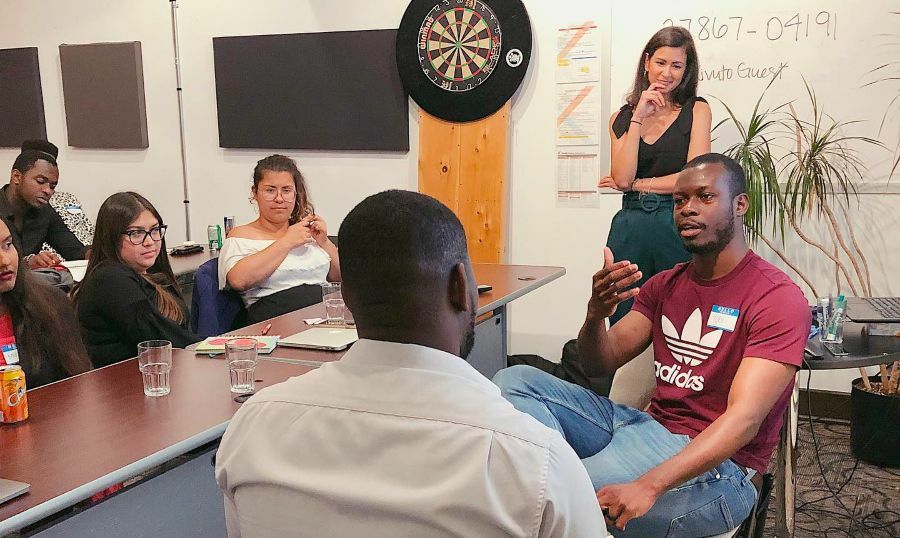
For most international students, do you believe going home would be an option? Or would most people say I can't go home after all this?
Tobi: Yeah, of course. It's always an option. My parents sent me to Canada against my will. I was like, 'I'm not going there.' They were like, 'yes you are going because we have already paid.' If you ask an international student what going back home signifies, they will tell you it means you failed. They sent you there not just for the education. They sent you there for a better life. For some people, coming back home says, 'dad I have nothing to show for this.' $30,000 a year is not chicken change. In my country, it's rent for four years in a nice house. It's a huge bet. I have two siblings in Canada. My dad has spent $443, 000 on our education and living expenses. It's a huge investment. You can't just go back.
You graduated from university and you began looking for a job. There were no replies. What was going through your mind when all this was happening?
Tobi: I was just terrified. One, going back home is kind of shameful. On the other hand, it's actually embarrassing to finish your university degree and be working a minimum wage job. Not because the minimum wage job is embarrassing; but, it's because of the investment that has already been made. For me, I was panicking. Every student wants to, in some way, thank their parents for making that bet on them. As a result, they want to create a great life and somehow reward their parents. I was freaking out because I thought I wouldn't be able to do that. The second part is, if you are an international student, you get a three-year work permit. In order to qualify for permanent residency, one of those years has to be worked in a full-time position. If you are not able to find a job, parents probably want you to come back home, and this is because they are still paying your rent, your food, and all that. You might have to go home permanently, and you will have nothing to show for it. What was going through my head was, 'I have to get a job. I have to somehow pay my parents back for this, and I have to somehow be able to stay in Canada permanently.' I wanted to build a great life. I met my wife, who was then my girlfriend. I had a great church, and I finally had friends. I didn't want to just leave everything and go back home now. I wouldn't know anyone anymore.
You had a meeting with a CEO who was willing to give you a chance. How did this happen?
Tobi: I was just applying to jobs anywhere I could find them. I was applying on LinkedIn, social media, and through school portals. Everywhere I could find a job, I was pumping out applications. This is where the power of community comes in. Someone in my church says, 'hey, let me see your resume. Maybe that's why you're not getting jobs.' So, I give it to him, and he sends it back to me. He says, 'if you phrase your experience like this, you will probably attract some people.' I was like, ' Sure. I trust you. You seem to know what you are doing.' I took his recommendations, and I started sending them back out. One of the jobs I sent it to, was a company called Purple Forge. They were a nine-year-old company. A small start-up with nine people. That was the CEO I got to meet. I always recommend people go for small companies. They are more willing to take risks. Anyways, he called me in. There is no VP of sales. There is no Director of Sales. He is the top sales guy because it's his company, and there are only nine people. I meet him, and I tell him about my experience (not work experience) as an entrepreneur. He literally looks at me and says, 'you're going to be the top earner here.' I'm like, 'I don't know how you came to that conclusion; but, if you are offering me a job, I'll take it.' He was an entrepreneur, and he understood the hustle that it takes to build something. He saw that reflected in my resume, even though it didn't have any real work experience. This is why he took a chance on me. And now I teach people that your real life (outside of a work setting) can count on your resume. It's just how you phrase it. It's how you communicate that.
The reason he called me in, was because on my resume it said I generated $10,000 selling hoverboards. How this happened was, one day I got robbed at knifepoint by one of my customers. He pulled out a knife on me, and literally stole two hoverboards. I called the police. A week later, they found the person at the mall. I take that story and frame it as a comeback story. I sent it to all the newspapers in Ottawa. The Ottawa Sun runs it, and that month I generated $10, 000 in revenue. To him, looking at my resume, what he saw was someone who was resourceful. That was why he took a chance on me. He actually gave me a huge raise within my first month. He was like, 'you are actually doing really well.' We teach our students that if you are creating enough value for a company, they will pay you for the value you are bringing. That was how I got my foot in the door, and it was because someone helped me communicate my value in a way that was more clear.
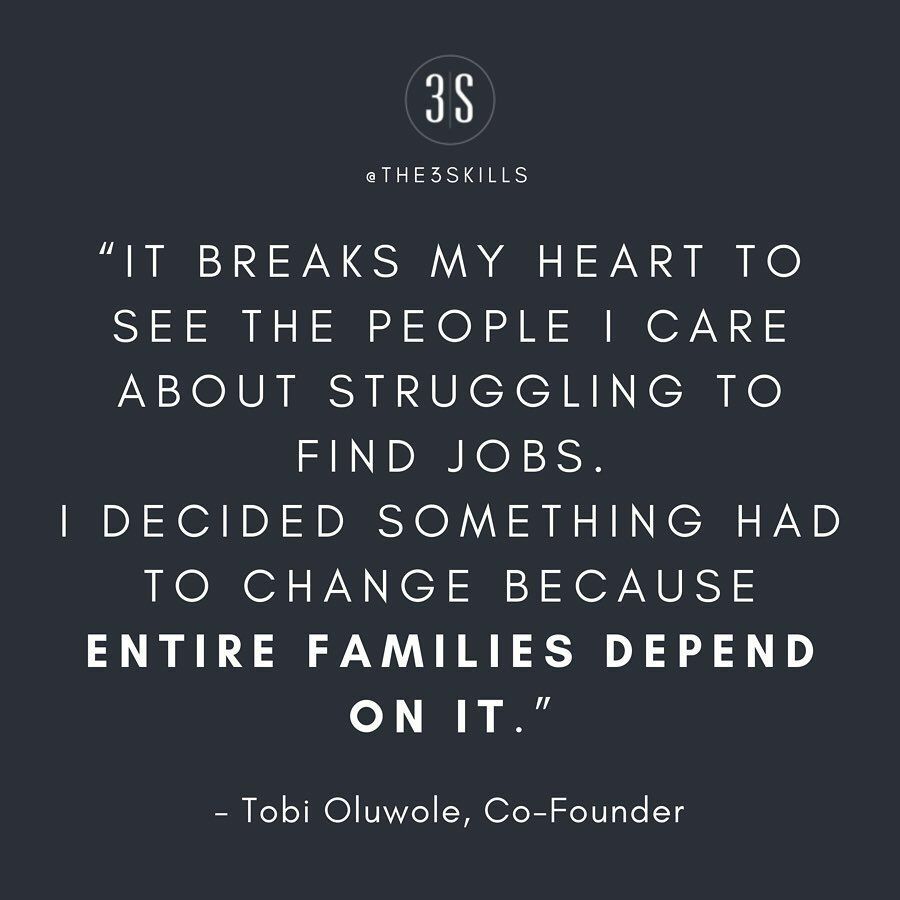
Could you tell me about the3skills? How did it begin? And what is its purpose?
Tobi: Literally all my friends, including my wife (no word of a lie) could not find jobs after school.
One day my sister breaks down (her mental health is being affected) and says, 'honestly, I think I'm going to have to go home, and I'll lose all my friends.' As she is going on about it, I remember I just started crying because when someone you love is hurting, it hurts you. I vowed to her, and I was like, 'I'll do something about your situation.' I walked up to someone I had done some sales consultation with after my first year at Purple Forge and said, 'listen my sister finished with an 11.83 CGPA out of 12 at Carleton. She taught herself Korean, piano, guitar, and how to do her own hair. I'm sure she can bring value to your operations team.' I pitched her in one minute to the owner of the company I worked for. He basically said, 'Listen, I'll interview her. If I like her, I'll take her.' And I said, ‘Pay her minimum wage and if you don't like her after one month, you can fire her.' And he said, 'ok. I'll take the interview.'
So I go home and prep my sister. She goes in for the interview and crushes it. She called me right after and said, 'he offered me the job on the spot.' I call him right after and he said, 'this is the best candidate I've ever interviewed.' Within eight months, she is the Operations Manager of the company. Again, a small company willing to take risks. And within a year, she has the experience that she needs to qualify for permanent residency.
That was in 2018. In 2019, a friend from church (who finished an HR program at a University here in Ottawa) told me that she paid $2400 to get help with her resume, her personality. My jaw dropped. $2400? No International student's parent is paying another $2400 to become more marketable. So I asked a co-worker, 'would you have paid $2400 for someone to help you with your resume?' She said, 'hell no.' I'm like, 'what would you have paid?' She said, 'maybe $250, max $500.' And I said, 'ok.' I went on my Instagram and I posted, 'I'd like to help five people get jobs. Send me a message if you are interested.' 50 people messaged me.
So at this point, I validated the idea. I validated a possible pricing structure, and I validated the market. I call my best friend in San Francisco (he was my roommate at Carleton) and said, 'we have been looking to start a business for four years. I think I have it. What if we just train international students on how to become more marketable and land a job?' I did some research and saw that they were struggling to land jobs. The government knew that they were struggling to land jobs; but, they're such a huge revenue generator. So I said, 'Josh let's solve this problem. Let's take it from four percent to ten percent. That would change the economy. They'll create enough jobs, and they'll have jobs. We can change the whole economy.' He said, 'okay. Let's do it.'
While I'm on the phone, my co-worker says, 'I was an International student and I wish I had the help. If you start a company, can I be a part of it?' I'm like, 'sure. If you are passionate about it.' My fourth partner saw my Instagram post and said, 'my parents came here as immigrants and really struggled. If you're trying to solve this problem, I'll have to be a part of it.' I said, 'sure. If you have a passion for it, you can be a part of it too.' Now I had three partners.
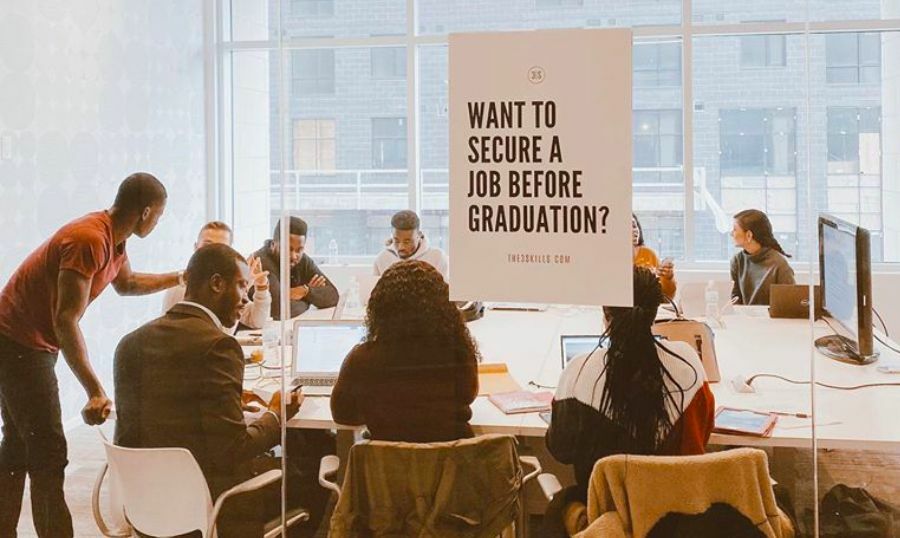
We called the 50 people who replied to my Instagram, and I said, 'hey, will you come for a free resume workshop?' I posted it on Eventbrite and 70 people signed up. 30 or so showed up in person, and the other ones asked for information after. But, that was the beginning of the business. The 30 who showed up we asked, 'Which of you feel like you need even more help? Interview prep? Want work on your LinkedIn? Want to know how to negotiate a salary? Need information on how to network? Personality test?' 18 signed up for our paid service.
We put together a boot camp. It was a one day, six-hour intensive course. We charged $250 for it. We had 18 students sign up on the spot. I said, 'we should probably incorporate.' So we incorporated the business, and we got a website up. We did the paperwork for it, and also opened a bank account. People started coming to the course, and they just went from zero interviews to between four to ten interviews within two weeks of finishing our course. We started having some people reach out to us. Carleton reached out. We had churches reach out, and there were two embassies that reached out (people who are invested in their people going into the workforce and doing something). That was when we really started taking it very seriously.
The reason people trusted us and still trust us, is because we know the struggle, we are immigrants, and also international students. We've also been able to actually get jobs and work in fields we want to work in. So, that was the trust factor. Now, because of the demand, we have some people asking us for help in Ireland and the States.
So now, we're building an online course that's going to launch on November 29th. This way people can go through our boot camp on their own time, and we usually will connect people who feel like they still need some help. We'll connect them with recruiters so that they can literally go into the company as a recommendation or as a referral. We're just trying to level the playing field for international students. They don't have a network. They don't know anybody. They don't have a support system. It's not like they grew up here. It's funny because now we're starting to get more Canadian students. This is because they are hearing about the success of international students.
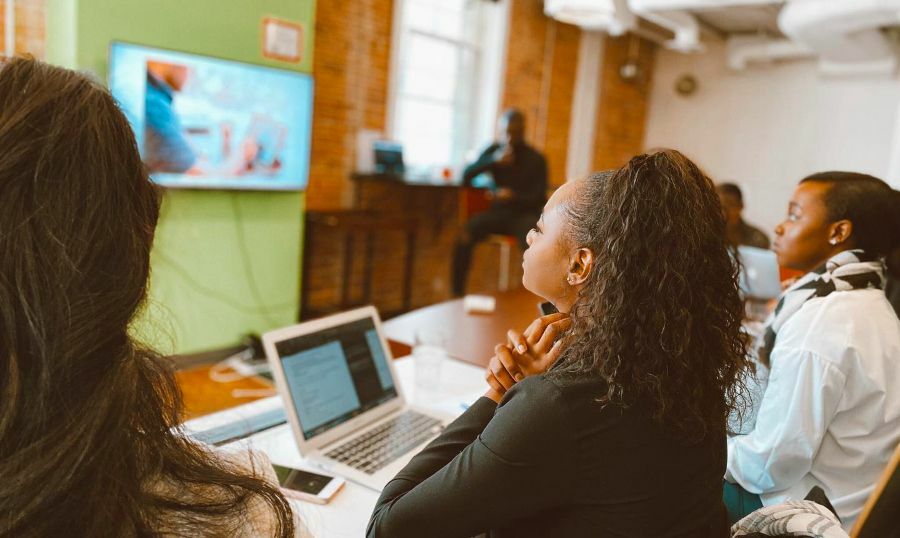
What can the Canadian government do to change the situation International students face?
Tobi: I think the role of the government is really just to create the infrastructure for things like that to change; not necessarily to change it. Justin Trudeau just committed another $148 million to bring in more international students. My thinking process is, if you are going to create or try to bring in more international students, at least equip them with what they need to become employable. It's not just education. There is a difference. There is a theory, and there is practical. My program or programs like mine, that partner with companies and then train students should be promoted or instituted. They should get the information to the International students.
It's an information and communication problem. It's not an infrastructure problem. What I would say is, Government of Canada we know you love having International students. They're spending $21 billion a year in Canada. It is amazing for your GDP. However, they're literally becoming less valuable once they finish school. They're not paying taxes because they are not making money. They're the ones who are getting into trouble because they're not making money. Why not just give them the skills? Give them the training that they need. The government will win. The schools will win because people will say, 'we're going to Canada. People don't just go to school there, they get jobs.' The very thing you're spending $30 million on, can be cut back to 10 or 15 million dollars a year.
What advice would you give international students?
Tobi: I would say meet lots of people, and work on lots of projects. This is what we teach the students who come in now. The phrase that says, it's not what you know, it's who you know is true. Don't just go to school, go to the lab, and go home. It's 2019, you can literally make money from things such as podcasts and magazines. Your hobbies can become income generators. We have friends who are making millions of dollars on YouTube. Whatever you are passionate about, make something out of it. Just do something. It doesn't matter if it takes off. What matters is that you did something when you were in school, and you have some sort of experience other than your small class project. Now you can show an employer that you were thinking outside of the box the whole time, and you can take a bet on me.
What would you say to those employers who don't believe international students are worth the risk?
Tobi: Some of these international students have more work ethic than Canadian employers have ever seen. They have something to prove, and there's more at stake. I think some companies believe they will have to deal with immigration one day, so they avoid those students. The government of Canada has made it easier for companies and international students. It's no longer a risk. Take a chance on them the way someone did for you. I'm glad someone took a chance on me.
Know a Black Canadian business we should feature? Email us: info at byblacks.com.
Lucy Oneka is a playwright and journalist. She has covered many stories for Toronto-based newspapers such as the East York Observer, the Scarborough Observer, and the Toronto Observer. Lucy’s other passion is music. She is a two-time semi-finalist of the prestigious UK Song Writing Contest and recently released her own debut gospel album, “You Are Faithful”.
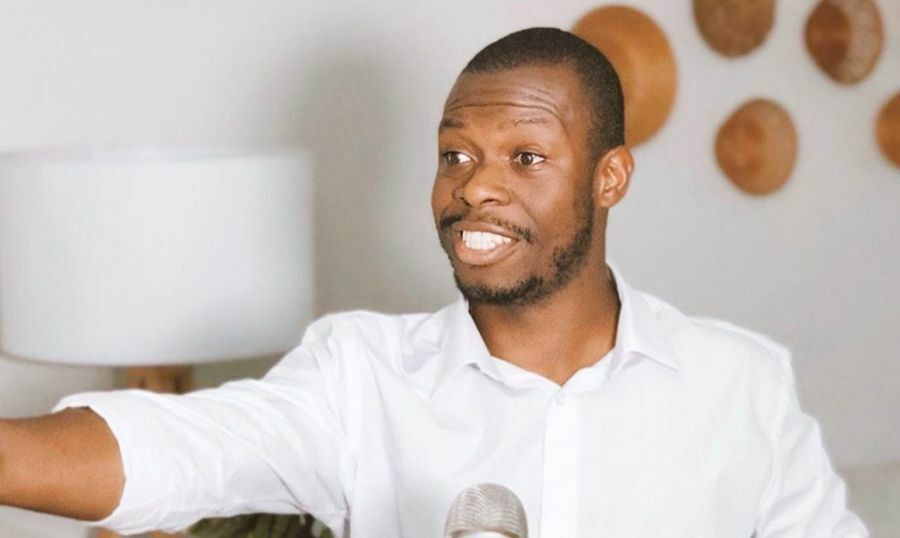
 By
By 




